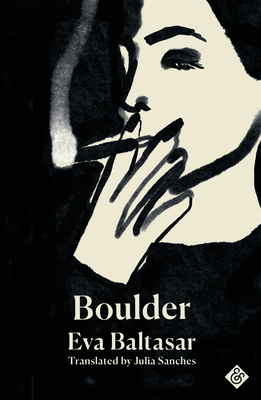Eva Baltasar
Translated by Julia Sanches
And Other Stories ($17.95)
by Abby Walthausen
New arguments are always popping up these days for the dubious title of the “first globalization”—phenomena as disparate as the spice trade, the crusades, the whaling industry. Catalan novelist Eva Baltasar (or perhaps the wry galley cook who narrates her newly translated novel) might get a kick out of extending the rebrand to boulders, which were, after all, dragged unwittingly around the globe and deposited haphazardly before the first sea shanty was ever sung. Boulders have a way of making landscapes both formidable and absurd—and Balthasar delves into this uneasy balance in Boulder, her idiosyncratic portrait of displacement across cultures and across dispositions.
The novel’s eponymous narrator, so named by her geologist girlfriend for her alien toughness, starts the book as a galley cook off the coast of Chile and winds up stunned and displaced in Iceland. “For a geologist like Samsa,” Boulder says, “Iceland is a paradise, and she shows me around as if it had come out of her own body.” Boulder is pushed across the world by love and the slow march of age, though nothing about her sharp-tongued, profanity-spouting demeanor is passive. In fact, Boulder sees herself more in the image of the proverbial rolling stone that gathers no moss, professing her discomfort with houses and her love of the “short term.” Like the narrator of Baltasar’s previous book, Permafrost, Boulder is repulsed by domestic life—but in this book she is faced with actually becoming a mother when Samsa insists on having children of their own.
Baltasar, a poet skilled in compression, moves swiftly from the initial heady encounters between Boulder and Samsa, first eliding five years, then another three, to arrive at the moment when Samsa decides that she needs to have a child. In this moment, Samsa is unrecognizable to Boulder, who attributes the unfamiliarity to this decision which “kicks into gear right away, without any warning. . . . razes everything to the ground, like an earthquake. You’d have to be an animal with a tiny brain and impeccable survival instincts to see it coming.”
Boulder is an engaging narrator—funny, tough, and as sympathetic as a line cook out of Anthony Bourdain’s kitchen—but the accumulation of her personality creeps up. About halfway through the book, when arguing against attending a prenatal water aerobics class, Boulder complains, “Samsa spat out her special brand of poison—the kind that doesn’t kill but leaves you blind, that erases your best memories and replaces them with a chasm for you to trip into and leave behind the skin of your knuckles and knees.” At first it feels a blessed reprieve to hear these venomous words described rather than repeated. A moment later, it sinks in that neither Samsa nor any other character had ever uttered any actual dialogue. The Samsa that the narrator’s voice has brought to vivid life has been muted by the same precise and knowing language.
Boulder’s carefully knapped facade is sometimes sharp and self-sufficient, sometimes blunt and desperate, but it engages from every angle. Again drawing on her skills as a poet, Baltasar has her narrator rarely utter an observation, whether cynical or mystical, that isn’t grounded hard in the physical world: “When I undress in the evening, the turtleneck snags at my head and reminds me that birth is nothing at all—the danger lies in being reborn.” She is a poet of the body, telling us, when postpartum Samsa loses interest in sex, that “Desire cannot be killed, it can only be fermented and rocked to sleep.” The link that she draws between physicality and the deep need for love echoes the attention she lavishes on food, which is prepared and described with the nuance she seems unable to deliver to her relationships.
“Blood respects nothing,” Boulder says when reflecting on the testing Samsa receives early in her pregnancy. “It creeps around like a shrewd domestic who has access to every room and knows everything there is to know about you.” On one level, she feels surveilled by medical intervention. On another, these lines hint at the latent anxiety of the gay family unit, in which one party is written out of the bloodline. Blood is indeed unfaithful—or at least, it tends to omit part of the story. The quiet, visceral joys of being are what Boulder discovers in the child, and they are what keep her tethered to her—and in the end, tethered to the long term. Still, she retains an absurd but steadfast resistance against time, trade winds, and small talk that is “more reckless than adopting a pet rat during a plague.” Boulder may have sailed across the world, but something deep in her rails against a life that can be reduced to vector.
Click here to purchase this book at your local independent bookstore:
Rain Taxi Online Edition Winter 2022-2023 | © Rain Taxi, Inc. 2023


